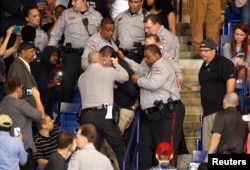The heated debate over the intense and often hateful atmosphere of Donald Trump’s campaign rallies continued Monday as the White House called for the Republican leadership to take responsibility for their party’s presidential front-runner.
Violent confrontations between protesters and Trump supporters at a Chicago rally Friday night prompted Democrats to blame dysfunction in the Republican party for the success of Trump’s often chaotic campaign.
“If you’re a Republican leader and you don’t stand for something, then your voters will fall for anything,” Press Secretary Josh Earnest said at the White House Monday. Earnest’s remarks followed President Obama’s reaction to the protests.
“If you don’t care about the facts, or the evidence, or civility in general in making your arguments, you will end up with candidates who will say just about anything and do just about anything,” Obama said at a fundraiser in Dallas Friday.
The president’s remarks sparked days of debate over partisan divides in the United States and the role of personal responsibility in a presidential candidate’s political dialogue. Analysts say Trump’s rhetoric is the result of a decades-long Republican party strategy to mobilize angry voters.
“Donald Trump didn't cause the coarsening in discourse in this country and the coarsening in culture where anything goes, but he’s exploited it,” said Norman Ornstein, a resident scholar at the American Enterprise Institute.
Ornstein said the Trump campaign's upending of Republican party orthodoxy follows what has been happening in American politics for decades, ever since the contentious days of the Nixon presidency and then into the 1980s and 1990s, as Republicans looked to wrest control of Congress away from Democrats.
The result was an atmosphere in which politicians were branded as traitors for working with each other, and the problem has grown during Obama’s presidency.
“We've seen a similar process of blowing up government, trying to make everything that it does look ugly along the way, voting in unison against anything that Barack Obama proposed because he's Barack Obama.”
Bill Galston, a senior fellow in governance studies at the Brookings Institution, says that while dysfunction in the party is certainly one of the issues at play, he sees voters directing their anger internally.
“The Republican party has tried to use the anger of working class whites for its own purposes, but that strategy turned out to be short sighted,” he said.
“The Republican establishment was toying with them, was not really doing anything to meet their objectives and needs, which have much more to do with their economic well-being than with foreign policy or social and cultural issues.”
One Trump challenger, Texas Senator Ted Cruz, has condemned the violence at his opponent’s rallies but acknowledged the anti-establishment sentiment among voters. Cruz said anger within the Republican party is directed at the president’s failure of leadership and the Washington establishment’s close ties with “the rich and powerful.”
“Barack Obama’s a world class demagogue. That language there is designed to divide us,” Cruz said in an interview with NBC’s Meet the Press Sunday.
The divisive language leads voters to seek unorthodox solutions.
“When a democratic political system, which depends in the last analysis on the ability of elected representatives to discuss their differences with one another and the American people, if such a system loses that capacity it's lost something very important and we need to think hard about how to regain it,” said Galston.
While the leadership in both parties seeks a place to lay blame, a more practical question has emerged: can a politician be held personally responsible for the impact their rhetoric has on supporters?
Local police are looking into charging Trump with inciting a riot at one of his rallies in North Carolina. Before the confrontations in Chicago, Trump routinely encouraged security and supporters to rough up protesters, and he used violent language to encourage his crowds.
“One of the reasons there’s so much energy at these events is that you have an aspiring political leader inflaming tensions and appealing to people’s darker impulses and capitalizing on their anxieties,” Earnest said.
Ornstein said Trump’s exploitation of the anger and frustration among his supporters “crosses the line for what we expect to see in a political process that has plenty of rough discourse and always has, but there are boundaries and we’ve crossed those boundaries.”
He said he doesn’t expect to see a lessening of the tension at Trump’s rallies anytime soon.






